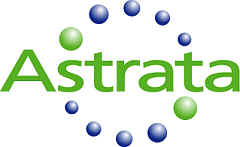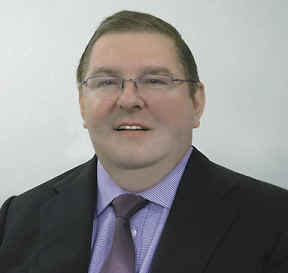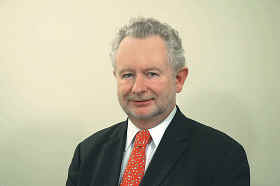Cover Story
CEOCFO
Interview Index
CEOCFO
Current Issue
Cover Story
Archives
Future Features
Analyst Interviews
Corporate
Financials
Archived Interviews
About CEOCFOinterviews.com
Contact
& Ordering |
This is a printer friendly page!
Astrata Group is rolling the company out very rapidly
- going from three offices in one country to eleven offices in eight countries in only 18
months

Technology
Communications Equipment
(OTCBB:ATTG)
Astrata Group Incorporated Inc.
1801 Century Park East-Suite 1830
Los Angeles, CA 900676-2320 USA
Phone: 310-282-8646

Anthony Harrison
Chief Executive Officer

Martin Euler
Chief Financial Officer
Interview conducted by:
Lynn Fosse, Senior Editor
CEOCFOinterviews.com
February 10, 2005
BIO:
Anthony Harrison – Chief Executive Officer
Tony Harrison was formerly with the Racal Electronics Group Plc., where he spent twenty
plus years working around the globe in a variety of senior management roles. He spent ten
years based in the United States managing the Group’s North & South American
business units, which he grew from US$7 million to over US$100 million. Tony also sat on
the board of the Racal Survey Group in London where he held the position of Chief
Operating Officer.
During his varied career, he has worked in sales and marketing, mergers and acquisitions,
and operations. He has made some important alliances and joint ventures, many of which he
chaired.
Tony was also actively involved in expanding the SkyFix Differential GPS network (the
world’s largest), which allowed the positioning of vessels and vehicles throughout
the world.
Prior to joining the Astrata Group, Tony spent three years with The Thales Group where he
was the Chief Operating Officer for the Thales GeoSolutions Group.
Martin Euler – Chief Financial Officer
Martin Euler has over 25 years of experience covering a variety of industries at both
operational and corporate levels. His career has included senior positions throughout the
world in both general management and finance with his most recent position being as
Director of the Americas Region for Thales GeoSolutions.
Based in the USA, Martin travels regularly to all regions as he assumes the
responsibilities of Chief Financial Officer. In addition, Martin is actively involved with
the initial operational integration of all new acquisitions into the Group.
Company Profile:
Astrata Group Incorporated (OTC Bulletin Board: ATTG) is focused on advanced
location-based IT services and solutions (GEO-IT) that combine GPS positioning, wireless
communications (satellite or terrestrial) and geographical information technology, which
together enable businesses and institutions to monitor, trace, or control the movement and
status of machinery, vehicles, personnel or other assets. Astrata has designed, developed,
manufactured and currently supports seven generations of GEO-IT systems with over 80,000
units deployed worldwide.
Sales are divided between two divisions: telematics
(remote asset management solutions) and geomatics (high-end professional GPS systems with
accuracies approaching three millimeters). Astrata has approximately 200 permanent
employees and employs nearly 100 people in its R&D and manufacturing divisions.
CEOCFOinterviews: Mr.
Harrison, what attracted you to Astrata?
Mr. Harrison: "I had been in the GEO-IT business for
almost twenty years with two major players; one was Racal Electronics Group Plc out of the
UK. The second one was The Thales Group, a French public defense company. During my time
with both of the companies, I got to know quite a lot about the technology being
manufactured in South Africa. Astrata is actually a culmination of three South African
companies. These three companies were put together and re-branded as Astrata in August
2004. I was interested in the technology and felt it was time for me to make a move in my
career; I wanted to do something very different. I had been the COO in a very large public
company for a long time and I had an ambition to be CEO of a public company. Therefore, it
was my time to move on. I was recruited by the Watley Group to come and run Astrata. The
technology in the Astrata Group, far surpasses anything available in the globe today and
the market is one of the biggest and fastest growing."
CEOCFOinterviews: Mr.
Euler, why are you at Astrata?
Mr. Euler: "I, like Mr. Harrison, was employed by Racal
Electronics Group Plc and subsequently Thales GeoSolutions for a number of years. I worked
with Mr. Harrison in the GPS sectors including telematics, and Mr. Harrison and the Watley
Group offered me the opportunity to join them in a new venture, which I found particularly
interesting and challenging. As such, I chose to join them early in 2004."
CEOCFOinterviews:
Astrata has recently become a public company, and there have been many changes; why is
this the time for Astrata to be on the move?
Mr. Harrison: "The market is growing at a very fast
rate. The GEO-IT market, which is worth approximately $7 billion today, is predicted to
grow to around $21 billion by 2007/2008. The reason for our expansion is that everyone has
become very aware of the GPS and telematics technology. If you buy a car today you often
get a GPS receiver in your vehicle. GPS is far more commonplace and readily accepted.
Coupled with that, there are many unsettling things
happening in the world today, which need this type of service – I’m talking here
about important issues such as homeland security. GPS, of course, also has a key role in
less threatening applications such as the management of vehicle and vessel fleets.
Productivity goes up when people can manage their fleets better, and the market is ready
for this type of technology. We believe that we have the most advanced technology
available. We feel we are two years ahead of the competition and we’re strategically
positioned to dominate certain sectors of the market. We have a solid and proven business
model, which is very similar to the cell phone model, where we give our tracking system
away free and charge a dollar a day for its use. That has never been done before in this
market. Bringing all this together, we are in a good position to move forward."
CEOCFOinterviews: What
is it about your technology that is different and better?
Mr. Harrison: "Let’s look where the technology has
been until now. In the early days of telematics, one of these units would cost you $4,000
or so, and the smallest unit you could buy was probably 6 inches by 3 inches deep. It was
low-tech stuff and it didn’t do much for you. Our new unit today is half the size of
a modern mobile phone. The unit itself has an actual computing system. It has a PC
in-built and an operating system. It has a quad band cellular telephone and a GPS
receiver. This has never been done before to this scale, so our technology has really
surpassed what is on the market today."
CEOCFOinterviews: Are
you able to protect that technology?
Mr. Harrison: "Absolutely! We manufacture the unit
ourselves; we design it and we write the software. We own the whole value chain."
CEOCFOinterviews: Will
you tell us about your manufacturing facility?
Mr. Harrison: "The manufacturing facility is in South
Africa. We have an R&D and manufacturing facility with about 100 engineers in
Stellenbosch, South Africa. We outsource the actual manufacturing of the PC boards
themselves. We do the design, the integration and we write the software. As the business
grows, we probably will outsource to a very large component manufacturer. We don’t
keep a lot of inventory. We plan our inventory with the suppliers going forward and we buy
in to meet the immediate market needs."
CEOCFOinterviews: Who is
buying your products?
Mr. Harrison: "This new product was launched last
October at a big conference in Africa called Auto Africa 2004, which is an event for the
automobile, fleet management and trucking industries. Since this launch, we have sold
about 2000 units and have orders for another 2000 units. We are selling to companies who
have trucks such as Ryder System Inc. (NYSE: R) and Penske. We have just been awarded a
very large homeland security contract with the Singapore Civil Defense Force to track all
vehicles carrying hazardous materials including those entering the country. We are
building 30,000 units as we speak which we believe we will sell by August this year. We
are now looking at how we go to the next level to manufacture 50,000-100,000 units because
when we do that, the price point goes down."
CEOCFOinterviews: What
geographic areas are you targeting?
Mr. Harrison: "In South Africa, the product is very well
accepted. It is probably the most mature telematics market in the world just because of
the security issues in South Africa. They were first to adopt the GEO-IT telematics
business. That market is good and it is growing fast. We decided when we re-branded
Astrata to go public that we wanted to go into an international market. We have opened
offices in Singapore, Indonesia, Malaysia and Brunei, where we have a contract with a
major international oil company. We have offices in London to roll out our business into
Europe. The Middle East is in the process of starting up and we will shortly be opening an
office in Dubai. We are very close to completing an acquisition in the U.S. There are
other markets that we could look at, but I think that in the early stages of the
company’s growth, we are going to focus on the markets
we know and where we can achieve a leadership position."
CEOCFOinterviews: What
are you doing in terms of R&D?
Mr. Euler: "Our increased activity in R&D will be
focusing on two specific directions. Firstly, we are already developing our next
generation of GLP (Geo-Location Platform), with an objective of further reducing size; at
the moment, the unit is approximately half the size of a modern mobile phone. We are
looking to further reduce the size and probably enhance the interconnect ability to gather
additional amounts of data. The second area we will be focusing on is applications we can
deliver to the customer. Our unit at the moment operates with a Linux operating system. We
describe it as an 80/80 offering. The unit as it stands, offers 80% of the applications to
80% of our customer base. We have a software developer’s kit that we will release to
customers, to allow them to write their own applications and add them to the unit, which
they can upload over the air. We will be looking to further develop these applications
into more specialist areas and make them available for a wider market. Obvious areas of
focus include container tracking and homeland security."
Mr. Harrison: "In
the Homeland Security sector, probably the single biggest threat to the country are
containers entering the country, and that does not just apply to the US, but to most
countries. Currently containers entering busy ports are usually unchecked and therefore
represent a major breach in security. Astrata is developing a system to track these
containers from point of origin to point of arrival, to assure people that they have not
been tampered with and pose no threat. This is a big growth area in the tracking market,
and it’s where we are focusing our research & development at the moment."
CEOCFOinterviews: You
have an ambitious plan; how are you funding these projects?
Mr. Euler: "To date, we have raised approximately $6.5
million dollars. At the moment we are in the middle of another round of financing. We have
appointed investment bankers, and we expect that round of financing to be completed in the
next ninety days."
CEOCFOinterviews: What
should potential investors know about Astrata?
Mr. Euler: "The first thing potential investors should
know is that our share price is relatively low compared to all of our comparables in the
sector. Our comparables in the sector are trading at approximately five times sales; we
are trading at a multiple below that. We are rolling the company out very rapidly.
Eighteen months ago, we had three offices in one country, and today we have eleven offices
in eight countries; it shows you that in fifteen months we have been expanding extremely
quickly. In addition, we have increased our R&D spending from less than a $100
thousand last year, to almost $1million this year. As a company, we have a complete value
chain. We are probably the only company in this sector that owns all aspects, from R&D
to design to manufacture to supply. We are running a relatively open system and we can
integrate our units into our customers’ IT systems, so we do not expect our customers to change their own IT system; we simply integrate our
GEO-IT information into our customers’ systems."
CEOCFOinterviews: What
are your biggest challenges going forward?
Mr. Harrison: "The biggest challenges we have are to
control growth and not to expand the business too rapidly. There is a limit to what we can
manufacture in a timeframe. That is because the components today can become very scarce
very fast. The last thing we want to do is to order too much and to have a lot of stock
around. We are controlling our growth as we roll the business out, and that is a
fundamental issue going forward. We don’t want to expand into too many countries and
sell too much too fast. A third challenge is to carefully assess the markets that we want
to penetrate. This business is so varied and so vast. There are so many possible
applications, that you can end up losing focus. We are targeting the areas where we
believe we can get very fast market penetration. By doing that, we believe we will be able
to control our growth and get to the right markets very fast."
CEOCFOinterviews: You
spoke about being committed to fostering customer loyalty; how do you do that?
Mr. Harrison: "In our business model, where we actually
give the unit away free and then we charge a monthly usage fee, we are constantly
developing applications. Our unit is being designed so that as soon as we have a new
application, we transmit it to the customers over the air. The customer does not have to
bring his unit back to us. We update all the new applications online. That way, we keep
our customers by staying ahead of our competition. And when our customers see their
productivity improve by using our services, they know we are keeping them ahead of their
competition."
CEOCFOinterviews: In closing, what should people remember
most about Astrata?
Mr. Harrison: "I think that the biggest selling point
that we have is the physical size of the unit that we are selling and what it can do --
the advanced nature of our solution and the innumerable applications that we can supply.
The company has been in the business for eighteen years with a proven reputation and track
record – we are staying for the long term.
CEOCFOinterviews: It
sounds like there will be more stories to tell in just a few months down the road?
Mr. Harrison: "It will be good to talk to you in six
months from now and bring you up-to-date on what we have achieved.
CEOCFOinterviews: I think our readers would appreciate that!
disclaimers
Any reproduction or further distribution of this
article without the express written consent of CEOCFOinterviews.com is prohibited.
|



